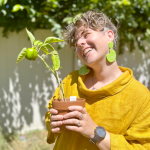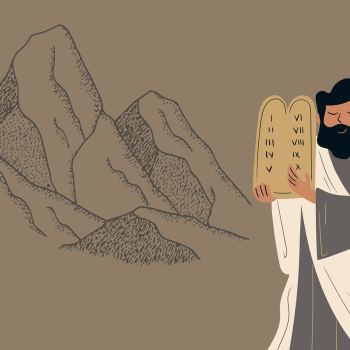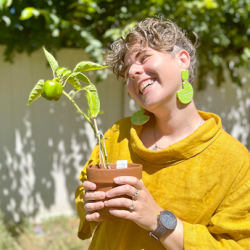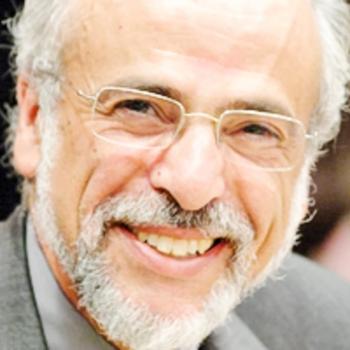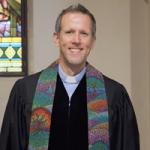Parashat Chukkat Numbers 19:1-22:1
Chukkat is a portion preoccupied with loss, limitation and attempts to cope with the consequences of human mortality. The very name of the parashah refers to a mysterious ritual for dealing with dead bodies described in the opening chapter. And this is followed by narratives of the deaths of two of the three leaders whom “[God] sent before you” (Micah 6: 4) as essential guides.
The second leader to die is Aaron, brother of Moses and Miriam, whom God had offered as “spokesman” for Moses at the beginning of their mission, and who then served as the anointed high priest for the people. The Torah gives us a detailed description of his death. In poignant verses, we witness Moses stripping the priestly vestments from Aaron and clothing Aaron’s son Eleazar to take his place. Then Aaron’s death on the mountain top. When Moses and Eleazar return, the whole community, realizing that Aaron has died, weeps for him for 30 days. Death is softened for Aaron by witnessing the literal passing of the “mantle” to his son, and for Moses and the people by shared expressions of grief over time. For many of us, this resonates powerfully with our own experience of the sustaining comfort provided by our tradition’s similar gift of long-standing rituals offering space and time for mourning.
In the Torah narrative, Aaron’s death anticipates the description of Moses’ eventual death on the mountaintop overlooking the promised land. At the end of the book of Numbers in the summary of all the people’s journeys, Aaron’s death is recalled with additional details about him including the resonant phrase also used to describe the death of Moses: he died al pi Adonai—at the command of Adonai. The literal meaning of this phrase, “at (or by) the mouth of God,” generated the beautiful midrash that both Aaron and Moses died by means of God’s kiss, suggesting a life ending with the same gentle and loving intimacy by which God began human life in our original creation—“God blew into [the human’s] nostrils the breath of life and the human became a living creature.” (Genesis 2:7)
As Rabbi Nehemia Polen puts it, “God’s mouth once again touches the mouth of [God’s] creature—we can imagine the strength of the seal formed by that intimate contact—and God withdraws the breath [God] had emplaced long before.”1
In contrast, Miriam, the first leader to die in our portion, receives five words, less than a third of a verse in the Hebrew. And the immediate consequences of her death also contrast drastically with the sustaining comfort provided after the death of Aaron. The verses after the notice of Miriam’s death in a place named Kadesh (from the root meaning ‘holy’), tell us of the very unholy outrage of the people, who experience yet another failure of their water supply and react in a familiar pattern. “Would that we had perished when our brothers perished before the Lord. And why did you bring the Lord’s assembly to this wilderness to die here, we and our beasts? And why did you take us out of Egypt to bring us to this evil place?” (Numbers 20:3-5) We’ve learned to expect an equally familiar angry reaction from God to the people’s failures of trust. But this time God offers a surprisingly gracious response, instructing Moses and Aaron to “speak to the rock” so that it will yield its water for the community and its animals.
Instead anger at the people erupts from Moses, who shouts “’Listen, rebels (morim)! Shall we bring forth water for you from this rock?’ And Moses raised his hand and struck the rock with his staff twice.” (Numbers 20:10-11). His anger succeeds in providing “abundant” water for people and animals, but summons deeply painful consequences for both brothers. “And the Lord said to Moses and to Aaron, ‘Inasmuch as you did not trust to sanctify Me before the eyes of the Israelites, even so you shall not bring this assembly to the land that that I have given to them.’” (Numbers 20:12)
Although Moses seems to be the sole actor, God judges both brothers for a failure to trust in God so as to “sanctify Me”(l’hakdisheini).
This accusation hints at a connection that might explain what has happened to Moses in this troubled stage of his long leadership. In the place called Kadesh he has failed to create more kedusha (holiness). He experiences his people as rebels, casting them, in their recurrent doubt and despair, as new incarnations of the arch-rebel Korach (from last week’s Torah portion). Moshe, who repeatedly pleaded with an angry God for forgiveness of a rebellious people, suddenly succumbs to outrage. Yet it’s crucial to notice the word he hurls at them: morim. In the Torah’s Hebrew text, written without vowels, this word looks identical to the name of the sister who saved him in childhood, supported him at the sea, challenged and affirmed him through the wilderness journey and who, immediately before this new challenge, died in Kadesh. In his angry words and aggressive action, I hear grief, and perhaps a sense of abandonment by Miriam’s sustaining feminine presence. As Rabbi Danya Ruttenberg suggests, “lashing out in anger can be a cover for a sense of deep woundedness and pain.”2
Our Torah tells us nothing about her brothers’ or her community’s response to Miriam’s death, but we can perceive, in Moses’ despairing outcry and violent action, what it can mean to suffer loss without the time and space to dwell with it. The community too, in its cry of despair over the loss of water, acts out its suppressed grief at the loss of the leader who has been associated with that life-giving element.
Although we hear nothing explicit about the unfulfilled need to mourn Miriam’s death nor its meaning for her brothers, we do see its consequences. Within a few verses of the Torah narrative, Aaron’s leadership ends with the “passing of the mantle.” But Moses, the sole survivor, receives the gift of possibility. He embraces an opening toward transformation from leader to teacher—a transformation we experience in the last book of the Torah. In our time of loss and despair, may this narrative offer us hope.
1“Sealing the Book with Tears: Divine Weeping on Mount Nebo and in the Warsaw Ghetto” in Holy Tears: Weeping in the Religious Imagination, ed. Kimberley Christine Patton and John Stratton Hawley
2Blog: Life is a Sacred Text, June 3, 2024
Dr. Judith Kates, retired Professor of Jewish Women’s Studies at Hebrew College, was a member of the founding faculty of the Rabbinical School. She taught Tanakh, midrash and the Jewish conversation around biblical texts for rabbinical students, and in many programs of adult learning at the college and the wider community. She co-edited (with Gail Twersky Reimer) two anthologies of contemporary women’s commentary on Biblical texts, Reading Ruth: Contemporary Women Reclaim a Sacred Story and Beginning Anew: A Woman’s Companion to the High Holy Days. In 2017, she received an honorary degree From Hebrew College.



